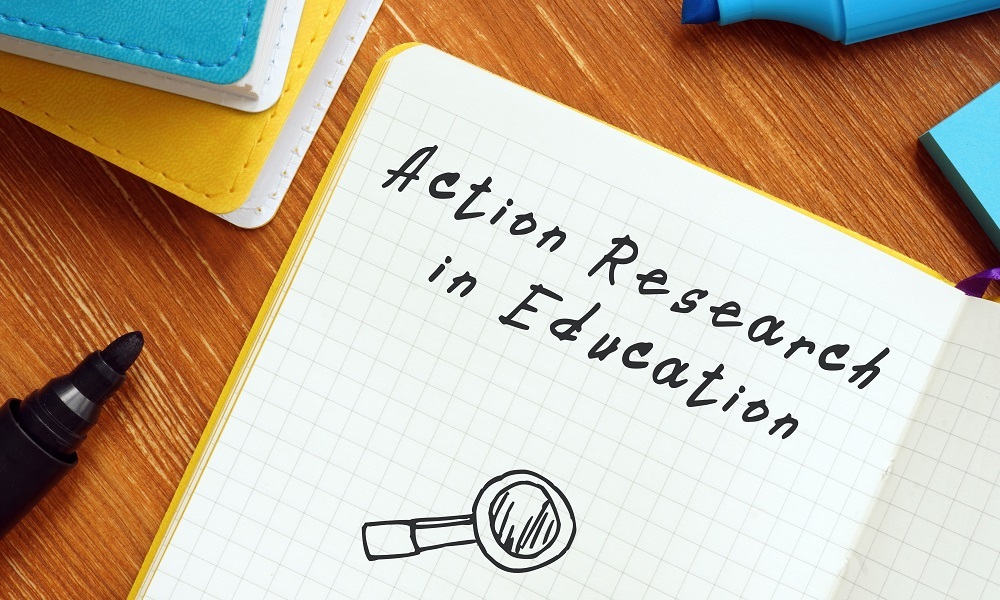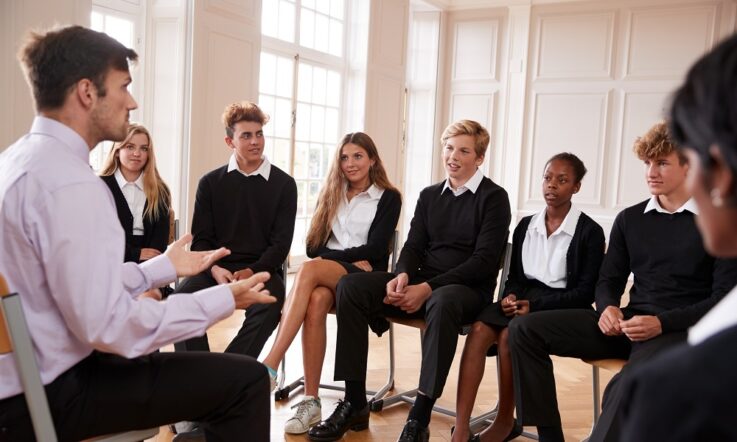This podcast from Teacher is supported by Bank First – the bank built by teachers for teachers. Visit bankfirst.com.au or speak to us to find out how your home loan or savings can care for the community like you do.
Thanks for listening to this podcast from Teacher – Episode 3 in our Action Research series. I’m Zoe Kaskamanidis.
As a teacher, if you’ve ever been interested in pursuing research alongside your teaching practice but haven’t known where to start, this episode’s for you. Today, we’re joined by Sarah Durack, a secondary Science and Mathematics teacher based in Sydney. Sarah has just finished her Honours thesis on the topic of school to university transition, which she completed part-time while working a full-time teaching job. As a teacher by day and researcher by night, Sarah tells us that while it wasn’t easy, it was certainly rewarding.
In this episode, she shares what it was like to juggle this workload, takes us through some of her research findings, and offers some tips for educators who may be interested in pursuing research themselves.
Before we jump into this episode, it would be great if you could take just a few moments to give a rating of our podcast if you’re listening to this audio on Apple podcasts or Spotify. If you’re listening on the Spotify app, just click on the three dots, then ‘rate show’, and if you’re on the Apple podcasts app you’ll find the rating section by scrolling to the bottom of our podcast channel page. On Apple podcasts, you’re also able to leave a short review for us. Leaving us a rating or a review helps more people like you to find our podcast, and is a really big support for our team.
Thanks for taking the time to support the work we’re doing. Let’s dive into this episode.
Zoe Kaskamanidis: Hi Sarah, thanks for joining us today.
Sarah Durack: Thanks for having me on.
ZK: So you’ve just finished your honours thesis, which has seen you combine researching part-time with a full-time teaching job. We’ll get onto that in a moment, but how long have you been teaching for and what’s your current role?
SD: So this is my fourth year. So I’ve taught for 3 years full time. And before that I was actually running a tutoring business, so I’ve kind of been tutoring since 2009. So I guess teaching formally – 3 years, but a little bit of ad hoc practice before then which definitely helped.
I’m a Science teacher, but I’m also trained in Mathematics, so I like to do a bit of where I can. And I’m working at an independent girls’ school on the north shore. And the school has over 1000 students.
ZK: And is the postgrad study and research side of things something you’ve always been interested in?
SD: Yeah, I think so. I finished my Science degree in 2013 at USYD (University of Sydney), went through their Science program there. And I at the time wanted to do honours but wasn’t well enough. So it was something I kind of kept in my back pocket as a plan to do, but I didn’t manage it at the time. I still maintained interest, of course. I think when you’ve gone through a Science degree, you’ve kind of committed to a lifetime of enjoying learning, and that was very much the case for me.
Both my parents are also in academia, so I was very well versed in the academic world, and wanted to go back and do it at some point. And then when I got into teaching, I got quite interested in educational research. Because it’s nice to be able to teach from an evidence-based perspective rather than just going off what you pick up as you go, which is equally important but it’s nice to have a backing in evidence-based practice.
So that’s when I got kind of keen again, and I had the research bug and so then I decided to go back, and I completed my honours through that lens, in education.
ZK: And so for your thesis then, you’ve been carrying out a school-based research project. What is the topic and why did you choose this as the focus?
SD: It’s a great question – I’ve taught Year 11 and 12 Physics, this year I’m teaching Senior Chemistry, and I’ve been tutoring Maths and Science and a bit of Engineering since 2009 as I mentioned before.
And so I’ve seen quite a few students move through the process and go to university. But I’ve always been curious for the ones that haven’t kept in touch – how they actually fared at uni, and how they adjusted well to the scope and the more rigorous academic tasks that the university provides, and the kinds of environments that they’ll find themselves in.
Yeah, the increased rigour I suppose. I’ve often wondered whether or not they’ve managed to navigate that learning curve. And so unless they keep in touch, it’s really hard to know how that happened.
So that’s why I was really interested in the school to university transition because I think it’s an area that isn’t studied enough, and especially for our Australian context. I wanted to get my teeth into that topic and learn first-hand how students were navigating the change. And whether or not their expectations of what they thought uni would be like were met with the reality that they experienced.
ZK: Before we talk about how you went about the research and what you found, what was it like combining these two aspects – so the research and the full-time teaching role? And, how did you organise that?
SD: If you ask people who know me well, I think they would say that it was a bit of a bonkers decision. And at times I definitely thought that myself. Schools aren’t really set up to accommodate this sort of thing, where you’re researching part-time as well as working full time. I just don’t think it’s that common, so I don’t think there are systems and processes in place to support people who are doing this extra load.
I found that the slow burn was definitely the way to go. If I chipped away on the project on weekends, it sort of got done over a number of weeks – the different bits I had to worry about, I suppose.
But I found during reporting periods and other really intense times at school, the project would get shelved. And vice versa during school holidays I got heaps of time to work on it and I made really big leaps during those periods. And, yeah, towards the end of the project I was working on it pretty constantly, which required family and friends to have a bit of understanding that I would be living under a rock for a while until I resurfaced with the thesis complete and the talk done and the viva done, so yeah. It was a time. But it was really worthwhile and I’m so glad that I did it.
ZK: And, this was all happening in the midst of the pandemic too, wasn’t it?
SD: Yeah, so there were a few changes that had to be made to the scope of the project, so I needed to submit amendments to the ethics committee, for example. Because the way that we were going to collect data had to change.
But I think teaching actually prepared me quite well for acting flexibly in the honours project. Because as a teacher you’re really used to the technology conking out on you and having a plan B. So in the case where the second lockdown came in, I was kind of emotionally prepared for having to change aspects of my project. And I think my supervisors were perhaps quite surprised that I was like, ‘Okay, right, cool, we’ll just make the changes and we’ll move on.’
You’re not going to be able to change it, so you might as well just adjust to it and work with what you can do.
ZK: We’ll hear more from Sarah after this quick message from our sponsor.
You’re listening to a podcast from Teacher magazine, supported by Bank First. Bank First is proudly Customer Owned – built by people just like you. Being Customer Owned means we can divert our profits to support initiatives you care about. Like $750,000 towards grass roots initiatives in schools since 1983. Your Bank First home loan can get you into your own home and support education for our kids. Email talktoabanker@bankfirst.com.au for more information.
ZK: As someone who’s juggled researching and teaching – what advice would you have for other educators looking to go down this path?
SD: There are a number of pieces of advice – from experience, things that I would do differently, or things that I felt I got right that I would recommend doing a similar way.
Picking a topic that you’re passionate about – you’ve got to do that. Because working on it part-time, I mean that changes a one-year project into a 2-year project or more. If it’s PhD or something like that, then you’re turning a 3- to 3-and-a-half-year project into a 6- to 7-year project. So it’s got to be something that you can look at and be bothered by for a decent chunk of time.
Choose a good supervisor – I was super lucky with mine. I had an amazing supervisor and also kind of an adjunct supervisor as well, both of whom just stood by me through the whole process and were really accommodating with my schedule. Because I could only meet after 5pm on Zoom. I think I only saw both of them a handful of times throughout the 2 years I was working on this. So they were really flexible and worked with me which was key.
And I think as well for a teacher, if you’re spending a lot of time at school, as well all do, pick something that you can do at or with school – that makes sense. Perhaps a data collection project that’s already happening at your school, or the results are already of interest at your school so you can get a bit of extra time or allowance that way. I think if you have support from the leadership or the administration of the school it will make life so much easier.
And yeah, expect to do it part-time or even less than part-time. It’s not something you could do full-time in addition to full-time teaching. It would not be a recipe for health and happiness – not at all.
ZK: Yeah, they’re really great tips. Let’s move on to talking about the research and your findings. First of all, then, what did your research involve?
SD: So I surveyed uni students at the start of and after their first semester at university. And I asked them things like, how often would they expect to experience lecture, demonstrations or lab work, group work, independent work. And I gave them a choice of qualitative options like, ‘Do you expect this to happen most of the time?’ Or often or occasionally or rarely or never. So that part of the survey that I gave the students was to work out how they expected to and then actually spent their time.
I also asked students through similar surveys to respond to statements like, ‘Lecturers will expect me to attend all lectures, laboratories and tutorials’. And that was from a strongly agree, agree, neutral, disagree or strongly disagree standpoint, with a view to get a sense of whether the students perceived expectations of them differently after they’d spent a bit of time at uni.
So I interviewed lecturers, to see if they have differing or the same expectations as students, to see if there was a mismatch there or if they agreed. And I also looked at students’ academic results as well to see if these incoming expectations or outgoing expectations had any bearing whatsoever on how they performed academically.
ZK: Fantastic. And let’s dig into the findings now – what were the highlights?
SD: There are a number of interesting findings, and I’ll keep it short because I know people are time-poor. In terms of how students are spending their time, I think students had more lecture or received more time spent lecturing than they expected. And they also spent less time working alone or in groups than they expected going into uni.
So when we surveyed pre- and post- that first semester, those expectations were changed. And I think that’s indicative of students expecting uni to be a bit more like the high school environments that they’ve grown to know and love. And when you think about it, teachers like me – I mean we don’t stand at the front of the classroom and talk at students for 50 minutes without any feedback requested or getting them to do any activities or respond in some way, or discuss with the person next to them. So I think that’s interesting; students are going into uni with these expectations that they’ve crafted with their high school environment in mind. And that may lead to some mismatches.
In terms of what students perceive lecturers expect of them, students think that lecturers will expect them to attend all labs, tutes and lectures a little bit more when they come in. But by the time they’ve been at uni for a semester, that perception that lecturers expect attendance actually drops off, which is interesting. They actually also think that lecturers will expect them to catch up on missed work a little bit less at the end of first semester.
The other interesting finding was that students were asked, ‘Do you think that lecturers will expect you to seek out their help outside of regular class time?’ And students said, ‘yeah, I think so’ – about 60% of them agreed with that strongly, or just normal agreement. And that dropped down to 35% after a semester worth of time spent at uni. So I think that’s interesting that students are changing whether they think they should be seeking out help.
Yeah, so that’s some interesting findings from the research. This was also done during COVID, mind you, so we added a couple of extra questions in about, ‘do you think that the School of Chemistry (in this case), that their response to COVID was effective?’ and students said, ‘yeah actually, we really appreciated the organisation of the unit and the constant communications via Canvas. It kept people on the straight and narrow, and feeling plugged into a support network.’ So that was quite nice feedback as well.
ZK: And as someone on the ground (you’re teaching in secondary) were any of the findings particularly surprising to you?
SD: Yeah. It was a bit worrying that some university students and their lecturers had mismatched expectations. So this idea that students are expecting not that much lecture. And then lecturers – in the case of the lecturers I interviewed – they actually were saying, ‘well we’re already moving away from just standing at the front of a lecture theatre and talking at students for 50 minutes. We’re actively incorporating active learning opportunities and worksheets’ and this sort of thing. And yet students are still saying, ‘I’m getting too much lecture.’ So things like that, I think, were a little bit surprising. It just goes to show how strong the expectations are that students go into uni with.
ZK: And what happens with those findings? So obviously you’ve written your thesis … but in terms of informing practice and maybe reflection and future action, how will the findings be used by yourself and your colleagues?
SD: So I think my plans at the moment, although I haven’t looked at it yet because I finished it in June, would be to write up this research for publication because there were some implications for student attrition in first year uni. You know, students are dropping off the bandwagon because perhaps expectation reality don’t match. So I think people really need to know about that, especially in our Australian context. So I’ll definitely be writing up and trying to get these results published.
The other interesting overlap, I think, with this research, is as a teacher of Science Extension – which is this new unit that in New South Wales the HSC is now offering – when I was doing this research, I was using techniques that students studying Science Extension were learning about. And so I think there’s definitely scope there for improved PD around Science Extension, like teachers who are doing research are so valuable to students who are learning about research. So I’d like to see that given a bit more air time.
And the other thing that I’ve inferred from this whole process is that data really is the way forward in education. We can learn so much by analysing data in ways that perhaps we don’t spend enough time doing. It’s much more meaningful to do complex statistical analyses and get the gist of what the picture really is from those, rather than just a quick mean and perhaps median score which most of our rating software will spit out for us.
So, yeah, I think tracking what students do after the leave school, especially in this context would be valuable, and it should be done to benefit current and future students. So perhaps there’s scope there as well for some sort of initiatives within schools to do this.
ZK: Fantastic, well we’ll definitely be keeping an eye out for your paper down the track. Before we wrap up, is there anything else you’d like to add?
SD: I think if you’re a teacher, you should think about pursuing research, if it’s something that you’ve had an inkling of being interesting to you. But you definitely need the right support to do it. And it’s not a short-term thing. If this kind of project of this size is not of interest – and I completely understand many people not wanting to do – action research is a great way of picking out a smaller, more bite-sized problem that you can really sink your teeth into. And yeah I think we should all be looking at doing this a little bit more.
But it’s all time, and so you’ve also got to ask yourself, ‘If I’m going to be committing to this, then what am I giving up?’, because saying yes to something naturally means saying no to something else – I think it has to. Otherwise, you just have no time for yourself at the end of the day. So yes, proceed with caution I think is the take home message. But also enjoy it. It’s a great way to spend time if it’s something you’re interested in.
ZK: Yeah I think that’s great advice and really inspiring too. Well it’s been an absolute pleasure to chat with you today Sarah, thank you so much for joining us.
SD: No worries, thank you for having me. It’s been a pleasure.
That’s all for this episode of our Action Research podcast series, thanks for listening. If you haven’t already, be sure to subscribe to our podcast channel on Spotify, Apple podcasts, SoundCloud, or wherever you get your podcasts from, so you can keep up to date with our latest episodes. If you want to keep listening now, you can access the 200+ episodes already in our archive.
You’ve been listening to a podcast from Teacher, supported by Bank First – the bank built by teachers for teachers. Visit bankfirst.com.au or speak to us to find out how your home loan or savings can care for the community like you do.
In this episode, Sarah offers some wise words of advice for teachers interested in pursuing research while teaching full time, including choosing a topic you’ll maintain interest in, studying part-time (or less) and seeking support from the leadership or administration team at your school.
As a teacher, if you’re considering pursuing research, reflect on which of these measures you can take in the beginning to make juggling these workloads more manageable in the long-term.



